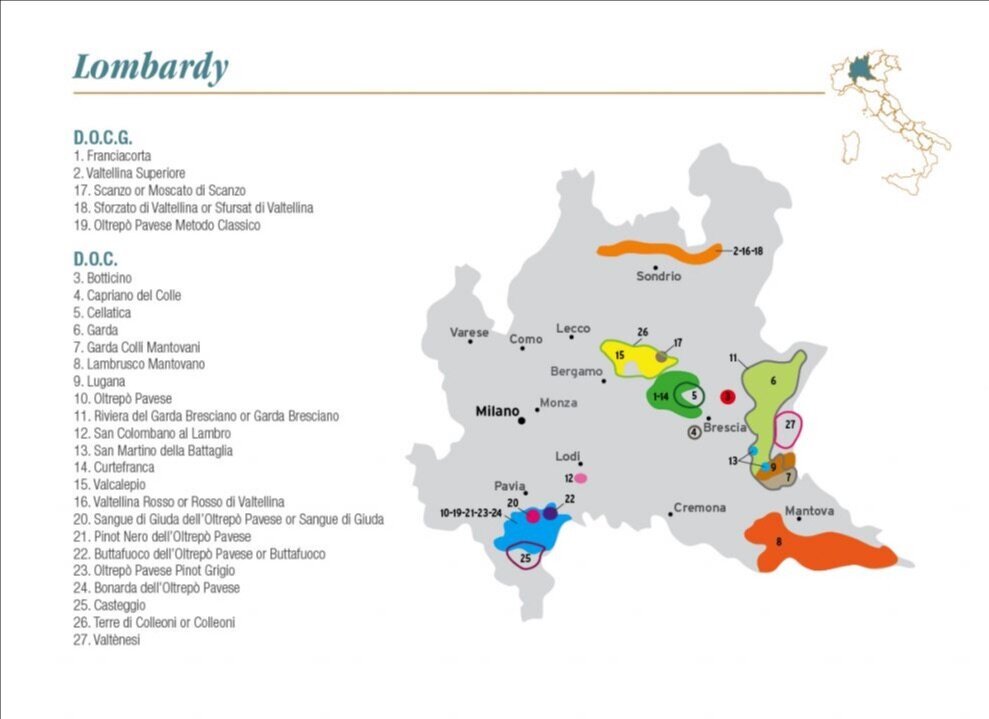Villa Picta - Lombardia, Italy
We’re introducing the wines of Villa Picta - their first appearance in the USA. Proprietors Laura and Paolo make their home in a crossroads of rivers and regions: their vines are in Lombardia technically, but far to the Southeastern edge, on the border with both the Veneto and Emilia regions. From their area called Mantova or Mantua, Laura and Paolo make a range of joyous sparkling wines, perfect to be enjoyed with the grand snacks of a work-from-home afternoon…
Our first visit to Villa Picta was in May 2019, and would have been likely to return to their neck of the woods April 2020 were it not for a global health crisis… It’s an important time to support our wine friends in Lombardia, especially the very small, expressly dedicated ones where their wines are their livelihood.
Villimpenta is their home, just north of the river Mincio, fed by the Po and by Lake Garda. Paolo spoke of a river called Tione that flows through it: (unlocateable on any online maps but is referenced in some writing about another Mantovanese specialty, rice). The soils of this region are clay, sand, and silt-based. For us, real Lambrusco explorers, our store would be incomplete without a very rare, super delicious Lambrusco Mantovano — and now, it’s finally coming!
We are drawn to Lambrusco like we are drawn to regional folk music. Lambrusco is easy to be with, a crisp cotton shirt plucked off a sunny clothesline. It’s a wine of farmers that bubbles with homegrown pleasure, bottled young and bubbles arising in bottle. We have long forgotten the boring and cruel opinions so many repeat that lambrusco is sweet or uninteresting — these dismissals are like rejecting Robert Johnson’s music based on what you hear on your primetime radio country station, its singers all trying to sing in a disingenuous twang.
click to enlarge
(When you taste wine, what do you taste? Is it the wine itself or is it someone else’s idea of what that wine is? Or, do you taste your own memory of other similar wines?) Instead — we consider how delightful it is when you realize that sorbara sings in a different accent than grasparossa, though when you first tasted and investigated they were both just “red fizzy things”. The towns speak in the dialects of grapes: Sorbara, Santa Croce, Grasparossa, Salamino, Maestri, Marani, mystery grapes everyone has forgotten the name of. These are all the names of different places that grow different kinds of lambrusco grapes. Ian D’Agata names them likely the oldest family of indigenous grape varieties in all of Italy—there are at least 50 different known varieties of lambrusco. They sing small perfect songs of small perfect places, when the right person is making the wine.
At Villa Picta, the raw material of their wines is the grape variety lambrusco ruberti (sometimes called lambrusco viadanese). Ruberti is one of lambrusco’s hyper-specific expressions of place, only grown in Mantova. This red grape grown only in Mantova, has a sweet spice and gentle tannin to it. The two wines we have this first round from Villa Picta both come from this grape, although they also grow garganega, merlot, and lambrusco di sorbara. Ruberti is another clone of the sixty-some odd number of lambrusco clones, named for the person who discovered this variety and encouraged other farmers to plant it.
Laura and Paolo work to emphasize the singular tone of their kind of lambrusco and of their home through organic farming and natural fermentations. They farm just three hectares of vines! Villa Picta is a new project of theirs that they started in 2013 producing the first vintage in 2015. The original property was planted to vines by Paolo’s grandparents. They do not use any systemic herbicides or pesticides, and are in the process of receiving organic certification. Laura comes to winemaking from a vegetable farming background. Paolo is a sommelier — together they make beautiful, delicious, thoughtful wines.
Click to enlarge
We smiled when Laura and Paolo told us that one of their favorite winemakers was Lucio Canestrari, winegrower of Il Coroncino (Verdicchios - Il Bacco, Il Coroncino) in Castelli di Jesi. Lucio is one of Italy’s most convincing wine-folk singers — he has brought a certain kind of fame and renown to his small corner of the world—no, smaller than corner, his hill. And he did it through continuous dedication to low intervention farming and winemaking, never succumbing in his long career to the temptations of mechanized farming and laboratory-like manipulation. We’re always referring back to the Miles quote — man, sometimes it takes you a long time to sound like yourself. Lucio is just the kind of person who’s taken years and years to sound like himself and achieved a kind of fame in certain places, a real Stanley Trexel of the Marches.
They regaled us with mortadella, hams, chunks of parmesan, stories about their chickens and their family. It was overcast and over the tops of the vines you could see the church on the other side of their property, dedicated to the Madonna of the snow. The legend of the Madonna of the snow tells a story about a miracle on Esquiline hill in Rome — the Madonna chose a very special place for snow to fall, one August night, impossibly on the hottest night of the year. Roman patrons honored her with a temple on this spot. Laura and Paolo are just starting out, in the grand scheme of things, but their wine is delicious and rooted in the place of its origin. The grape Ruberti is the temple built on the snow fallen on Villimpenta, the means through which its inhabitants express the fullness of their home. Here, there is no need to be elsewhere.
On the first day that COVID-19 started to get real here in Portland in 2020 we woke to a dusting of snow. Everything, including the thick snowy covering on the ground, said: stay in your home. There is no need to be elsewhere. The whiteness outside obscured and drew our attention in to immediate surroundings. The room we’re in: are the books alphabetized? Perhaps keep rearranging the furniture to find the best light during the day? Plant some ruberti vines in the yard?
(LB)
Click on each wine for more detail.










